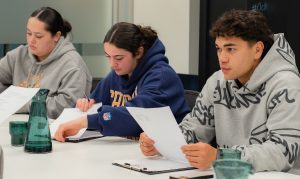Supporting Māori Aspirations – Rangatahi back community with $180,000 in grants

Community initiatives supporting rangatahi in Murihiku Southland have been backed with $180,000 in funding, as selected by a group of young Māori tasked with making funding decisions on behalf of their peers.
Te Ōhaka Tīwhera is a collaborative fund supported by Te Rourou, One Aotearoa Foundation in partnership with Community Trust South, Invercargill Licensing Trust (ILT), ILT Foundation, and Clare Foundation, and is led by ten local rangatahi (aged 14-20 years). The 2023-24 funding wrapped up in March and is the second cohort of funding, following $240,000 allocated in 2022-23.
Over the past 12 months, the rangatahi have distributed funds for creative and innovative projects or initiatives which support rangatahi to connect with their culture. The group allocated funds to the following initiatives:
|
· Murihiku Māori Rugby Charitable Trust – Supporting wānanga and travel for rangatahi Māori rugby players in Murihiku · Te Oriori Trust – He Taura Here, a youth-driven initiative aimed at increasing Mātauranga Māori through marae wānanga · Active Southland – Rangatahi Leadership Group to provide Māori and Pasifika rangatahi with the tools to succeed within their chosen sports · Te Wharekura o Arowhenua – Visit to Waitangi for the Waitangi Day celebrations to learn firsthand the significance of Te Tiriti o Waitangi · Te Oho Mana – Building connection and sense of identity by providing mentorship and learning in te taiao · Ka Taoka i Tuko Iho – Supporting Māori aspirations through sport · Atuitui Charitable Trust – Providing opportunities for cultural exposure and involvement through traditional dance and music · Southern Queens Boxing – Delivering boxing training, mentorship, and enabling rangatahi to find their identity |
Te Rourou Community Catalyst Mandy Smith says this round of Te Ōhaka Tīwhera highlights the diversity of the decisions made by rangatahi, who support tried-and-tested initiatives while boosting new, innovative programmes.
“By interviewing each applicant in person, the panel of 10 rangatahi gauge the successes of existing programmes; what’s working and what they will need to continue, but they’re also quick to support new kaupapa they see as having potential. There is a lot of kōrero and thought going into those decisions,” she says.
